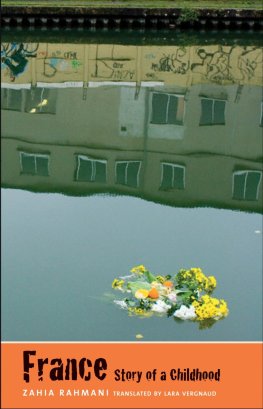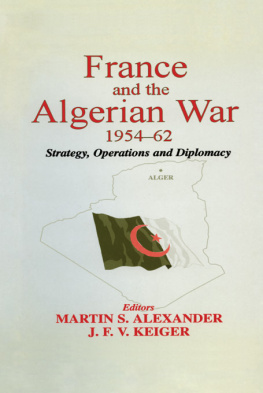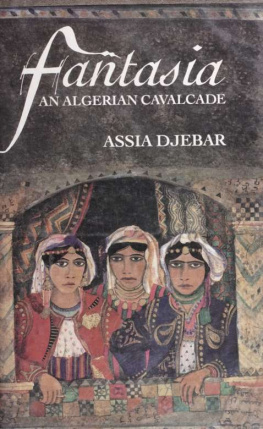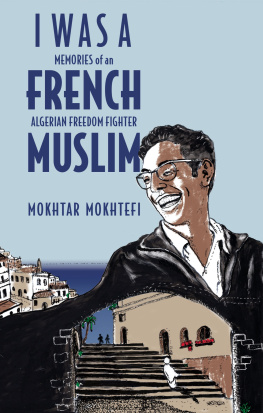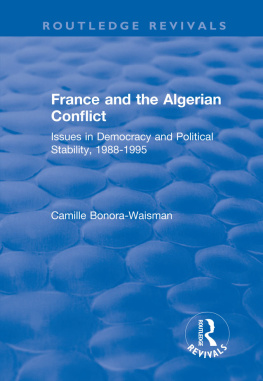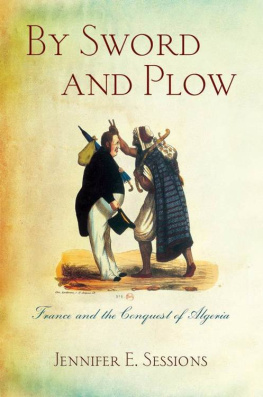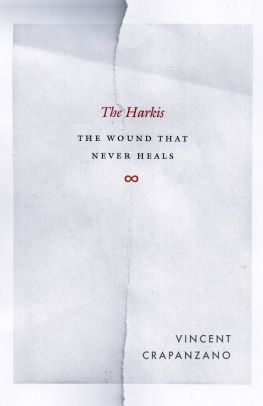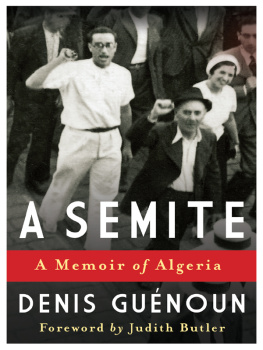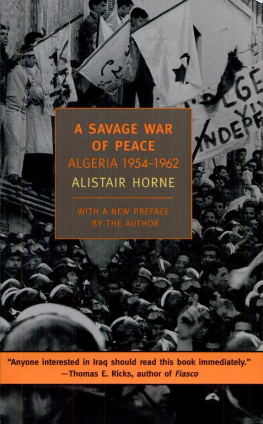Zahia Rahmani
France, Story of a Childhood
To Lounis At Menguellet and to Nicolas
Man cultivates his imagination in the place where
he is born.
When adversity and war displace him far away
he is tempted to imagine
what his life could have been without this rupture,
if only to forget for a time
what they think
of him here.
Wouldnt turning to I
be for him, in this case,
the only fiction possible?
Translators Acknowledgments
Thanks to Alyson Waters and Emmanuelle Ertel for their support and insight, Allison Schein and Chris Clarke for their honest feedback, and the PEN/Heim Translation Fund for its generous grant. Finally, I must thank my treasured readers: Diane, Mohamed, and Anthony.
Translators Introduction byLara Vergnaud
France, Story of a Childhoodthe third in a loose trilogy of novels by Zahia Rahmaniis difficult to categorize. Often described as fictionalized autobiography (autofiction), the work has a poetic, nonlinear style more resonant of fiction than of nonfiction. Inspired by foreign literature, music, and art, particularly from the United States, the author-narrator employs restrained yet lyrical prose to describe her difficult childhood in an adopted country, France, all the while paying homage to her Algerian heritage. Historical events figure prominently against the cascade of childhood memories revealed by the narrator over a single day as she cares for her convalescing mother.
Rahmani was born in Algeria in 1962, amid the political instability that followed the Algerian War of Independence from France (19541962). During the war thousands of Algerianssome estimate several hundreds of thousandswere recruited or coerced to fight as auxiliaries alongside the French army against their countrymen; these men were dubbed Harkis after the Arabic word harakah, meaning movement and, more recently, military or political unit. After the Algerian War, the word acquired a more sinister meaningtraitor. Like many Harkis, Rahmanis father was imprisoned after the war. Yet the author would later discover that her fathers arrest and imprisonment stemmed from political reasons and that he had, in fact, never worn a uniform or borne arms. (This fabrication and its consequences are the subject of Rahmanis first novel, Moze.) In 1967 Rahmani and her family fled to France, to a small town in the rural region of Oise, a forty-five-minute train ride north of Paris. There, they would experience a new brand of contempt and ostracism. France, already overwhelmed by the unforeseen return of approximately one million repatriated Frenchmen (pieds-noirs), was no more accepting of the Harkis than was Algeria.
Although Rahmani sets her novel against this turbulent history, she seldom refers to the Harkis, using the term only thirteen times. During my first meeting with the author, in Paris in the summer of 2012, Rahmani, reluctant to be pigeonholed, stated that she prefers to be regarded as a French rather than a Harki or Franco-Algerian writer. Indeed, though France has at times been assigned to a small but growing corpus of so-called Harki literature, the author-narrators vivid recollection of her childhood in Oise is the true force propelling the narrative. Relationships are central to the novels emotive core. Several figures dominate: Hocine, the narrators older brother; Madeleine, an elderly villager; Anne-Marie, a liberal teacher; and a domineering father, unnamed in an echo of his mute response to a traumatic past. And most vivid, the narrators mother, Ourida.
In a milieu marked by ignorance and at times hostility, the reserved Ourida is determined in her efforts to ensure a future for her offspring, while keeping her adopted country at arms length. For her children, she will bequeath an unspoiled legacy . . . filling in a void that [they] cross with growing strength. That is her greatest gift. Through cultural education rooted in the oral tradition of Kabylie, Algeria, and transmitted through Kabyle, a Berber dialect, Ourida strives to outmaneuver what the narrator perceives as a massive machine assembling against herthe whole of France. Replete with the echoing voices of the narrators ancestors, parents, siblings, friends, neighbors, and teachers, France evokes the potency of oft-dismissed oral cultures. The result: a patchwork of legends, memories, literary quotations, and songs.
But a fine thread holds this patchwork narrative together. Though skipping across space and time, often on the same page, and even in the same paragraph, the narrator always returns to an attic room in her family home in the Oise countryside. As she keeps watch over Ourida, the attic room aboveonce playroom, library, lounge, and sanctuaryfills the narrators thoughts, unleashing a torrent of childhood memories.
Anchored to this attic hideaway, the reader voyages to turn-of-the-century Kabylie, where Ourida grew up, on to Algiers in the turbulent 1980s and 1990s, and forward to the iconic Gare du Nord in modern-day Paris, where the narrator grapples with the news of her mothers illness. Then back again to Oise, the verdant, curiously flat region that stars in the narrative. Though the narrator rages against the racism she encounters in her small town, she nonetheless respects the inhabitants savoir-faire, which, in her eyes, is as magical and transformative as the mythology of faraway Kabylie. She devotes detailed passages to the now forgotten arts of cultivating poplar trees, preserving vegetables, assembling sausage casings, and crafting hairbrushes from stiff hairs and plastic, revealing her affection for her rural neighbors.
Still, the Oise village can be both haven and trap. At times, the villagers emerge collectively to alternately welcome and reject, inform and disappoint Frances young narrator. Hence the tone of the narrative wavers between nostalgia and resentment (let them keep their before, we all respected one another).
Equally formative, if more abstract than Oise, is the United States. The works of several American authors, many from the 1930s and 1940s, resonate profoundly with the narrator. The circumstances of Richard Wrights Black Boy may be foreign, but his words illuminate the narrators own struggles:
I dont live in a black ghetto in Memphis where everything would be off-limits, but in a white ghetto where all individuality is refused me. The word God is never pronounced in my presence, but Im reproached for my parents religion without being told why its not as good as any other. In the villagers minds, Im Muslim, which for them equates to a kind of barbarism.
Later the narrator experiments with social activism, buoyed by her readings of John Reed, Jack London, Erich Maria Remarque, and Joseph Conrad. But Wright, Hemingway, Steinbeck, and Faulkner remain the prominent ghosts in the attic room. Foreign music, theater, and art provide additional outlets, but the influence of American literature in particular permeates this largely dialogical text.
France unfolds deliberately and with restraint, evoking the plain writing of Erskine Caldwell. Like the American author, Rahmani eschews excess, what she calls gras, the French word for fat: Tonight, I lead a symphony, no omissions, no embellishments. I have few instruments. This sparseness heightens the intensity of the narrative. In one of our many email exchanges, Rahmani explained, A feeling of proximity, a shared world, a language created for the other, the foreigner, unfolds. Anything that could obstruct [my] intentions is removed from the text.
The prologue to France, a series of vignettes recounted from a childs perspective, establishes the novels austere voice, which many French reviewers have described as

